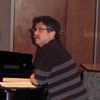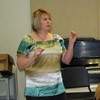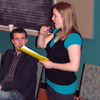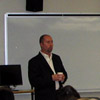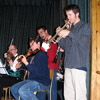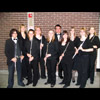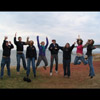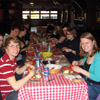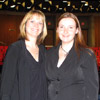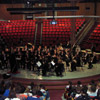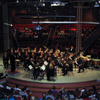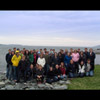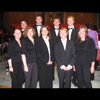Instrumental Music Education:
A Sampling of Leadership Initiatives at Brandon University
by Wendy McCallum, DMA
In this edition of Ecclectica, this article will describe music educator leadership initiatives that have been core in the establishment and sustenance of community in the School of Music at Brandon University. These initiatives include the Symphonic Band's Atlantic Band Festival tour, activities of the Brandon University Student Music Educator's Association, and Avenues, a professional development opportunity in instrumental music education. A leadership-based stance to student growth and community building in instrumental music education has had a positive impact on instrumental music performance levels, music education student engagement, and public school instrumental music educator interaction with Brandon University.
Teaching knowledge and skills in music and music education are both parts of my teaching assignment and professional purpose at Brandon University; these two mandates are inextricably linked. My perception of successful practice in music and music education are influenced by my belief in the importance of two basic student outcomes: the ability of a student to actively participate in music making, and a student's ability to function independently within the context of the music making process.
In the instrumental ensemble rehearsal environment, each musician's individual voice should be valued, and each ensemble member should be expected to contribute to the ensemble's musical interpretation. Effective rehearsal allows opportunities for a musician to learn how to listen, to learn what to listen to, and to think about what is significant in each part of the music's texture. However, students must take responsibility for their own learning, and this only occurs if, and when, they feel that their input is valued. Ideally, students should appreciate components of the ensemble experience such as individual contribution and the importance of ensemble sensitivity as attended to in consideration of balance and blend. In practical terms, balanced sections affect the success of the ensemble and its ability to create a characteristic sound.
In a performing ensemble, repertoire serves as the foundation of a program's curriculum, as the primary tool for student motivation, and as the basis for artistic expression. The Symphonic Band provides opportunities for students in the School of Music to perform quality wind literature and to be exposed to a wide variety of compositional techniques, musical forms, and rehearsal processes. Repertoire studied includes that which is core to the wind band medium, relevant to students, contrasting in character and performance demands, and sequenced to allow for consistent and gradual growth and development.
In the School of Music, large ensembles are a key component of the music and music education curriculum. Although it is assumed that rehearsal periods are the foundation of the ensemble experience, musicians are required to prepare their parts individually, and group sectional rehearsals are a significant expectation in order to achieve ensemble clarity. The successful group sectional requires significant consistent student leadership in order to deal with the section's personnel, assess sectional priorities, and develop a cohesive performance unit within the ensemble. Ensemble rehearsals are also an important yet indirect means of instruction for students in music education, primarily as an opportunity to observe positive leadership models. These models must demonstrate effective rehearsal strategies and value student-centered learning. As in every teaching and learning environment, there is a need for a sense of community that increases the impact and value of the content and process of the activity.
While the majority of the Symphonic Band members are music majors, not all students are performing in the area of their applied concentration. Because Symphonic Band includes students from various stages of their degree and from different degree programs, a sense of community and shared leadership in the ensemble is essential. In 2008-2009, planning, organizing, and performing in an ensemble tour created a positive learning environment for musicians of the group.
Symphonic Band Atlantic Tour photos
From April 25 to May 2, 2009, Brandon University's Symphonic Band launched a tour that included five performances in Atlantic Canada. The 48-member ensemble rehearsed and performed concerts in Charlottetown, Prince Edward Island as well as in Windsor and Halifax, Nova Scotia. By invitation, the ensemble performed as the featured ensemble at the Atlantic Band Festival at Mount St. Vincent University in Halifax. During the tour Dr. Catherine Wood, faculty clarinettist and Manon Lafrance, trumpet virtuoso and Yamaha guest artist were featured soloists with the group. The ensemble had access to six separate rehearsal venues (on Prince Edward Island in a junior high band program, in the music department at the University of Prince Edward Island, and at Confederation Centre as well as in Seton Hall at Mount St. Vincent University in Halifax) and performed for nearly 3,000 junior high and high school students, ensemble directors, and music professionals from across the country. The Atlantic Band Festival's mandate is to give musical groups the opportunity to have a learning experience appropriate to each individual ensemble's experience level and goals (www.bandfest.net), and the Symphonic Band's appearance at the festival contributed to the festival's vision for educational leadership in instrumental education.
The Symphonic Band's repertoire was selected to challenge the ensemble throughout the academic year, but also to provide three contrasting programs for our concerts during the tour. A complete list is included in Appendix A, and you may also hear a recording of Frank Ticheli's American Elegy recorded on March 24, 2009. In addition to the ensemble's rehearsal and performance activities on tour, BU students conducted lessons and master classes with concert band and jazz ensemble high school students. Symphonic Band members were able to attend performances and clinics of junior high, high school, and university ensembles at the Atlantic Band Festival.
Brandon University Student Music Educators Association
The music education program in the School of Music at BU has a rich history of student leadership that extends back more than twenty years; the Brandon University Student Music Educator's Association (BUSMEA) was founded as a student organization committed to the professional growth and development of its members. Members of the student executive have initiated, planned, and coordinated all aspects of professional development activities for its members.
Since 2007, the BUSMEA council has successfully offered the Da Capo Conference with funding support from the BU School of Music, Manitoba Band Association, Canadian Music Educators Association, and local sponsors. Presenters at this one-day conference have included recent graduates, public school music educators, BU faculty including Wayne Bowman, Sheila Scott, Sheelagh Chadwick, Greg Gatien, Wendy McCallum, and Michael Cain as well as guest speakers from other academic institutions. For the past three years, the group has attempted to include student music educators from academic institutions in Manitoba, Saskatchewan, and North Dakota. Conference events have included a keynote address, a new teacher forum, and presentations specific to elementary, choral, general, or instrumental education as well as workshops on music technology, the job search process, and educational leadership.
In coordinating the conference, BU music education students handle all aspects of the conference including administration, fundraising, facilitation of guest speakers, grant applications, hospitality, scheduling, facility management, technology, advertising and public relations, registration, and budgeting. The knowledge and skills obtained by students through the organization of the Da Capo conference are invaluable to their development as future teachers, leaders, and administrators, and this content is all mastered before the conference even begins. Additional professional development clinics organized by BUSMEA during the academic year have included a Research Series and clinics by public school music educators, music supervisors, School of Music faculty, and industry partners.
During the 2008-2009 academic year, the BUSMEA council initiated the BUSMEA BUZZ, a print and on-line newsletter for its members and the music education community. The journal is possible as a result of funding from the School of Music. Content in the organization's first three newsletters included upcoming BUSMEA Council activities, reviews of workshops and performances, article and book reviews, the "Techniques Corner" (pedagogy), interviews, professional development information, "Building Bridges" (exploring relationships between music and music education), and reflections on teaching and learning. In its first year, I edited the newsletter as faculty advisor, and it was formatted by fourth-year music education student, Stephanie Dzubinski.
Avenues: Exploring Band and Jazz Methods
The Joint Department of Music Education continues to work to establish positive collaborations with public school instrumental music educators. Since 2005, the School of Music has hosted a summer workshop, Avenues: Exploring Band and Jazz Methods. Since its conception, the basis for the event has been the word avenue and its definition: avenue - a way of access, a channel for pursuing a desired object.
Professor Greg Gatien and I conceived Avenues as a professional development opportunity designed to review, stimulate, and explore instrumental music education. The summer workshop, now in its fifth year, offers music educators the chance to gather, communicate, and collaborate at the School of Music. In addition to formal presentations and round-table discussions, the two days include active participation in conducting activities, review of instrumental techniques, development of jazz pedagogy skills, instruction in music technology, and informal gatherings. Innovative approaches address a broad array of topics including conducting, repertoire selection, improvisation, and rehearsal techniques in beginning, intermediate, and senior band and jazz. During the event, a resource room allows music educators to examine quality resources and literature. During its first five years, Avenues has featured guest clinicians such as beginning band specialist Marguerite Wilder from Jasper, Georgia, BU faculty clinicians Alan Ehnes and Michael Cain, program alumni Kelly Demoline and Matt Duboff, and industry partner Tricia Howe from Long & McQuade Music in Winnipeg.
For workshops in 2009, the emerging theme is centered around leadership and short- and long-term planning. Avenues 2009 welcomes Bill Kristjanson, educator from Vincent Massey Collegiate in Winnipeg and Manitoba Music Educator's Association President, newly-appointed BU faculty member and jazz percussionist Eric Platz from Boston, as well as the Dean of the School of Music, Michael Kim. Registration materials for this year's workshop can be downloaded at http://www.brandonu.ca/Music/Events/Events.html.
In the context of our present and ever-changing culture, creative leadership skills are a pressing valued priority that we must continue to nurture. The Symphonic Band tour, BUSMEA's professional development initiatives, and the annual Avenues workshop are three examples of leadership initiatives in instrumental music education in the Brandon University School of Music. All of these diverse activities on our campus have served to develop leadership skills in our music education community. Participants on the Symphonic Band tour develop additional skills in performance, pedagogy, and collaboration; the Da Capo Conference creates opportunities to develop practical skills essential for success in music education; Avenues affords music educators from across the country the opportunity to develop, refine, and reflect on past and present practice in instrumental music education. Perhaps the clearest future goal for the music education profession is to stay connected to the strengths, needs, and concerns of our members.
Appendix A
Brandon University Symphonic Band Repertoire
Atlantic Band Festival Tour: April 25-May 2, 2009
Concerto for Bb Cornet or Trumpet: Joseph Haydn
Toccata Marziale: R. Vaughan Williams
Arranged for Military Band by W.J. Duthoit
Légende: (Solo Trumpet, Piano & Concert Band) Georges Enesco
Arranged by Alvin Lowery
Divertimento for Band: Vincent Persichetti
I – Prologue
II – Song
III – Dance
IV – Burlesque
V – Soliloquy
VI – March
First Suite in Eb for Military Band, Op. 28, No. 1: Gustav Holst
Revised and edited by Colin Matthews
I – Chaconne
II – Intermezzo
III – March
Cartoon: Paul Hart
An America Elegy: Frank Ticheli
Funa-Uta: ITO Yasuhide
Three Chorale Preludes: William P. Latham
I – Break Forth, O Beauteous Heavenly Light
II – O Scared Head Now Wounded
III – Now Thank We All Our God
Vesuvius : Frank Ticheli
Lyric Essay : Donald Coakley
Florentier March (Grande Marcia Italiana), Op. 214 : Julius Fucik
Arranged by M. L. Lake
Edited by Fredrick Fennell
Symphonic Dance No. 3 "Fiesta" : Clifton Williams
Concertino (For Clarinet and Band), Op. 26 : C. M. Von Weber
Arranged for Band by Alfred Reed
Edited by Don McCathren
Sword and the Crown: Edward Gregson
Photos from CAPO
Photos from Symphonic Band Atlantic Canada tour
Dr. Wendy McCallum, Assistant Professor of Music
Dr. Wendy McCallum received her Bachelor of Music (1992) and Bachelor of Education (1994) degrees from Brandon University. After graduation, she taught in Blumenort, Manitoba, before accepting a position as Director of Bands at Neepawa and Area Collegiate Institute. She was Assistant Director of Bands at Vincent Massey Collegiate Institute in Brandon in 1998-1999. McCallum completed a Master of Music in instrumental conducting at the University of North Dakota – Grand Forks in 2001 and completed her DMA in conducting, with a cognate in music education, at the University of North Texas – Denton (March 2004).
McCallum is a highly sought after clinician, conductor, adjudicator in Canada and the United States and was formerly Assistant Professor and Director of Bands at Graceland University (Iowa).

